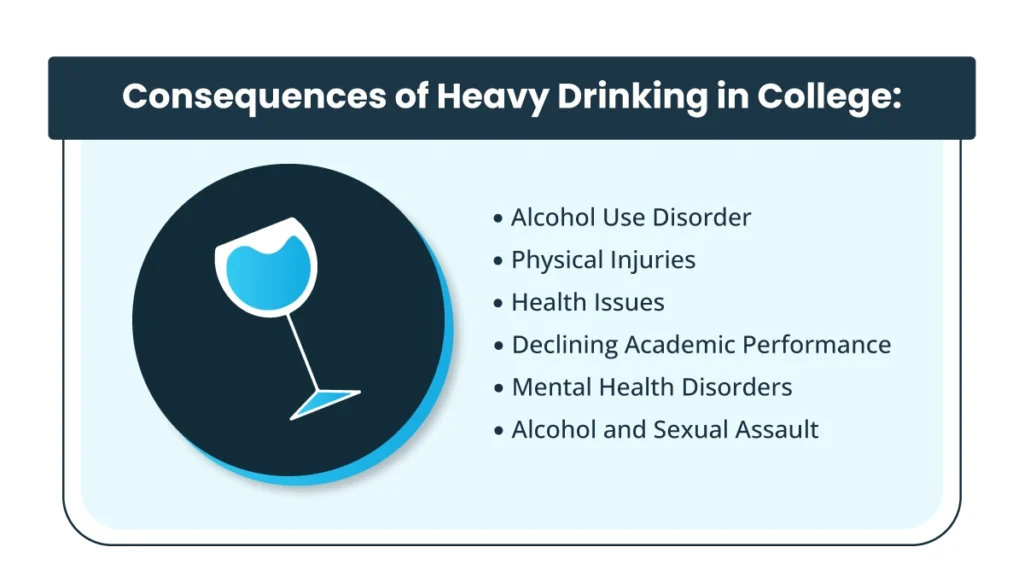College Binge Drinking and Alcohol Addiction
College is a time of exploration and profound change for young adults transitioning from adolescence. During this time, it is common for college students to have new experiences that can lead to experimentation and, many times, harmful habits.
For college students, alcohol is often seen as a way to make socializing easier, relieve academic stress, and can also symbolize their newfound freedom from home. Unfortunately, many young adults become too reliant on drinking during college, leading to various health, social, and academic consequences.

Alcohol Addiction in College Students
According to the National Institute on Alcohol Abuse and Alcoholism (NIAA), roughly 50 percent of students in college who are aged 18-22 had reported drinking in the previous month. 27 percent of these students also participated in binge drinking.
When it comes to developing serious drinking problems in college, the NIAA also reports that about 13 percent of these college students met the criteria for alcohol use disorder (AUD), which is a serious medical condition involving an addiction to alcohol that often requires treatment to overcome.
What is Binge Drinking?
A term you will commonly hear to describe the drinking habits among college students is binge drinking. This refers to a pattern of drinking where an individual’s blood alcohol concentration (BAC) is 0.08 grams percent or higher. For men, this can happen when they drink 5 or more drinks in about 2 hours, and for women, it is four or more drinks.
While binge drinking is not a disorder, it is a type of drinking pattern that can quickly result in a severe dependency or alcohol use disorder. Apart from the risk of alcohol addiction, this drinking pattern can also cause problems like alcohol poisoning, accidents, injuries, impaired judgment, risky behaviors, and long-term health issues.
Consequences of Heavy Drinking in College
The consequences of heavy drinking in college encompass not only the immediate aftermath of alcohol but can also result in long-lasting impacts on the individual’s life. One of these impacts is the development of an alcohol use disorder.
Partaking in heavy drinking in college can also negatively impact your academics, physical and mental health, and can damage your relationships and future prospects.
Alcohol Use Disorder
As we briefly mentioned before, alcohol use disorder (AUD) is a medical condition that can be characterized by a person’s inability to stop or limit their alcohol consumption. This heavy reliance on alcohol can result in a variety of serious consequences like liver disease, cardiovascular issues, and neurological damage.
Physical Injuries
The impaired judgment caused by heavy drinking can result in severe injuries to college students. These injuries can range from minor cuts to concussions or broken bones. Those with a higher BAC level are more at risk of getting an injury.
Health Issues
Over time, constant binge drinking can cause various issues to important parts of the body, including the brain, liver, heart, and immune system. College students who engage in heavy drinking have an increased risk of conditions like liver disease, a weakened immune system, cardiovascular issues, neurological complications, and even cancer.
Mental Health Disorders
While alcohol can help individuals relax and “loosen up” for a bit, students already struggling with mental health issues like depression or anxiety risk making their condition worse. It can also increase the chance of suicidal behavior and self-harm.
Declining Academic Performance
Consuming alcohol regularly in college puts students at risk of declining academic performance and can reduce their overall educational experience. Heavy drinking can reduce learning and retention, impair decision-making skills, increase absenteeism, and can result in a lack of participation. In fact, alcohol abuse has been directly linked to a decline in academic performance.
Alcohol and Sexual Assault
Alcohol use has been found to be closely associated with incidents of sexual assault among college students. Research indicates that alcohol consumption can play a significant role in both perpetrating and experiencing sexual assault on college campuses.
What Causes Alcohol Abuse Among College Students?
Alcohol abuse can come from a combination of social, psychological, environmental, and individual factors. For college students specifically, this can include things like peer pressure, academic stress and pressure, curiosity, underlying mental health issues, easy access to alcohol in college, and the lack of education on responsible drinking. Individuals who have a history of problematic drinking in their family are also more likely to participate in alcohol abuse.
Creating a campus culture that prioritizes well-being, safety, and responsible decision-making can help mitigate the risks associated with alcohol abuse among college students.
Signs of a Drinking Problem in College
When it comes to college students, there are a few unique signs that can indicate an individual is struggling with alcoholism. Addressing these signs right away can increase this person’s chances of a successful recovery and allow them to get back to their academics much quicker.
Declining Grades
Students who are struggling with a drinking problem often experience impaired cognitive functions like memory, concentration, and information processing. This can make it extremely hard for the student to understand and retain the course material, resulting in lower grades on assignments and important exams.
Missing Class
The consumption of alcohol among college students can be linked to the increased chance of missing classes. Setbacks like hangovers and discomfort, poor time management, lack of motivation, and mental health implications can cause a student to have an increase in absenteeism.
Unhealthy Sleeping Patterns
Heavy drinking can increase the risk of an individual having issues with their sleep. The consumption of alcohol can disrupt the natural sleep-wake cycle, which causes difficulties with falling and staying asleep. This lack of sleep can result in various academic issues like lower grades and increases the chance of students missing class.
Mood Swings
Drinking alcohol often can alter the balance of neurotransmitters in the brain, which includes serotonin and dopamine. These are what are responsible for regulating mood and emotions. The neurochemical changes caused by the consumption of alcohol can result in mood fluctuations and increased emotional instability.
Lack of Motivation
Regular consumption of alcohol can also result in a severe drop in motivation among college students. The impact of a student’s cognitive abilities due to alcohol consumption can result in a lack of focus and can hinder their ability to set and commit to academic goals. Issues like poor time management and sleep disturbances can make it difficult for students to stay motivated and achieve their goals.
Self Isolation
It is common for college students who regularly participate in binge drinking to self-isolate themselves. This can be for a variety of reasons, like an increased feeling of social anxiety or a fear of judgment, issues with personal relationships, or mental health disorders like depression.
Treatment
The treatment of (AUD) among college students comes with a unique set of challenges that can often require a comprehensive approach that addresses the complex interplay between academic responsibilities, social pressures, and the physiological and psychological impacts of excessive alcohol consumption.
There are a variety of evidence-based treatments designed to help individuals overcome their addiction to alcohol and get back to a healthy way of living.
Detox
Detox, which is short for detoxification, is the initial step in the treatment for alcohol use disorder. This process involves removing harmful substances like alcohol from the body. In detoxification, the body works to metabolize and expel alcohol, allowing the person to begin the journey toward sobriety. Ideally, detox is conducted with the help of a medical professional in a safe and secure environment. When detoxing at a treatment center like The Haven Detox, you have access to 24/7 medical monitoring as well as medication that can help alleviate painful withdrawal symptoms.
Below are the common symptoms of withdrawal from alcohol.
- Tremors
- Anxiety
- Nausea and vomiting
- Insomnia
- Headaches
- Irritability and agitation
- Seizures
Therapy
After undergoing detox, patients can attend behavioral therapy sessions to help them better understand themselves and their addiction. Treatments like Cognitive Behavioral Therapy(CBT) allow patients a safe place to identify and reconstruct their negative thinking patterns and develop better-coping strategies with the help of a trained therapist.
Medication
There are several medications used in the treatment of alcohol use disorder to help individuals manage cravings, reduce the severity of withdrawal, and prevent relapse.
Below are the most common medications used in AUD treatment:
- Acamprosate: Reduces withdrawal symptoms
- Disulfiram: Causes unpleasant physical reactions like nausea when the individual drinks alcohol, which can help discourage them from drinking
- Naltrexone: Reduces alcohol cravings by blocking the euphoric effects of alcohol.
Peer Support
One of the most valuable components in the treatment of AUD is peer support groups. Peer support can provide individuals with a sense of belonging, understanding, and shared experiences. The groups can also help individuals stay motivated and held accountable for their decisions during recovery.
Frequently Asked Questions (FAQ)
How is alcohol affecting college students?
Alcohol can affect students’ academic performance, increase health risks, cause behavioral issues and societal consequences, and even legal ramifications. The heavy consumption of alcohol can also result in the development of alcohol use disorder (AUD) over time, which often requires treatment to recover. Cultivating a supportive and non-judgmental environment where students can seek help and guidance is important for addressing the harmful impact of alcohol on college campuses.
Why do college students drink so much alcohol?
There are many reasons that students in college often drink large amounts of alcohol. This can include factors like wanting to fit in, drinking to cope with stress and a lack of education on the dangers of alcohol. Students in college also consume alcohol frequently due to how easy it is to access.
How does alcohol affect college students’ mental health?
Consuming alcohol can impact the mental health of college students in many different ways, often exacerbating existing mental health issues or leading to the development of new problems. Heavy drinking can cause or worsen conditions like depression and anxiety, impair cognitive function, increase the risk of suicidal behavior, and cause disturbances in sleep.
Find Treatment for Alcohol Addiction at The Haven Detox
At The Haven Detox-Little Rock, we understand the impact that alcohol addiction can have on individuals and their loved ones. Watching your loved one in college struggle with alcohol dependence during what is supposed to be an exciting time in their lives can be difficult. Our comprehensive treatment programs are designed to provide a supportive and compassionate environment for your loved one to recover as comfortably as possible.
With our team of dedicated professionals, including licensed therapists and medical experts, we can provide personalized treatment plans that are tailored to each individual’s unique needs and goals in recovery. Through a combination of medical intervention, behavioral therapy, and holistic wellness practices, we can foster long-term recovery and sustainable sobriety.
If you have a loved one in college who is battling a drinking problem, early intervention can increase their chance of a smooth and successful recovery. Through our residential treatment program, we provide a safe and secure environment where individuals can find understanding, encouragement, and the necessary tools to overcome addiction and regain control of their lives.




